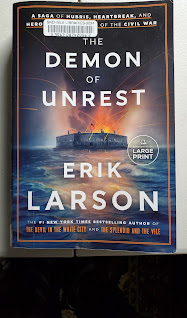Libraries
are Essential
Carla Hayden, the first woman and the first African
American to serve as the Librarian of Congress was sacked by Donald Trump on Thursday
night, May 8th this year. His press secretary, Karoline Leavitt,
said that her continued service did not fit the needs of the American people,
did not serve the interests of the American taxpayer, and the President is well
within his rights to fire her.
In published remarks in June, Ms. Hayden said she got a
short email from Deputy Director of Presidential Personnel, Trent Morse: “On
behalf of President Donald J. Trump, I am writing to inform you that your
position as the Librarian of Congress is terminated effective immediately.
Thank you for your service.”
No contact in person before or after, no phone call,
just one email. Trump’s former personal lawyer, Todd Blanche, is now in charge
of the facility.
In an editorial by author George Saunders on May 13th,
he tell us that one of the things he and Dr. Hayden bonded over was the idea
that knowledge is power; that in a democracy, the more we know, the better we
are.
Firing the Librarian of Congress was alarming. Are our
libraries under threat from this administration? Or was it just another
cultural makeover, as when Trump fired Colleen Shogan, Archivist of the United
States in February. Secretary of State Marco Rubio was put in charge as Acting
Archivist.
Ms. Shogan stated that no cause or reason was cited. “It
has been an honor serving as the 11th Archivist of the United
States. I have zero regrets – I absolutely did my best every day for the
National Archives and the American people.”
In 1949, the United Nations Educational, Scientific and
Cultural Organization (UNESCO), published a Public Library Manifesto: “The
library is a prerequisite to let citizens make use of their right to
information and freedom of speech. Free access to information is necessary in a
democratic society, for open debate and creation of public opinion.”
When we read, we gain access to information and
knowledge and culture and history and art. In person or online, librarians make
suggestions about what we might want to read, based on asking us questions, and
by pointing us to the material and by telling us how we can search for
ourselves.
Caring and helping are normal human instincts. Most
everyone has strong feelings and memories associated with the libraries they
visited and the help they received.
Susan Orlean wrote The
Library Book, and in it she says that a library is a place where you feel
part of a conversation that has gone on for hundreds and hundreds of years,
even when you’re alone. And she concludes by stating that all the things that
are wrong in the world seem conquered by a library’s simple unspoken promise:
Here I am, please tell me your story; here is my story, please listen.
James Baldwin said: “I went at least three or four times
a week (135th Street branch of the New York Public Library) and I
read everything there. I mean, every single book in that library. In some blind
and instinctive way, I knew that what was happening in those books was also
happening all around me. And I was trying to make a connection between those
books and the life I saw and the life I lived.”
Ursula Le Guin: “A library is a focal point, a sacred
place to a community, and its sacredness is its accessibility, its publicness.
It’s everybody’s place. I remember certain libraries, vividly and joyfully, as
my libraries --- elements of the best of my life.”
Ray Bradbury: “Libraries raised me. I don’t believe in
colleges and universities. I believe in libraries because most students don’t
have any money. When I graduated from high school, it was during the Depression
and we had no money. I couldn’t go to college, so I went to the library three
days a week for 10 years.”
There are two national groups that advocate for
libraries: the Public Library Association (PLA) and the American Library
Association (ALA). Island County libraries are part of the Sno-Isle Library system
which has 23 branches, the Library on Wheels, and Express Lockers at three of
their libraries.
In support of the Sno-Isle Library branches, there are
sixteen Friends of the Library chapters. These are nonprofit volunteer
organizations that bring together people who support and promote the services
and programs of their respective libraries. Money raised by these groups goes
toward programming for all ages, summer reading programs for children and
teens, library capital improvements, special project funding and more. This
link provides contact information for the Friends of the Library groups.
https://www.sno-isle.org/friends-of-the-library/
The Sno-Isle website lists their Vision, Mission, and
Values. Their mission is to engage and inspire our communities through
equitable access to knowledge and resources. Their values are straightforward:
Community, Equity, Inclusion, Welcoming, Learning, and Respect. I believe the
majority of Americans embrace and live these values.




